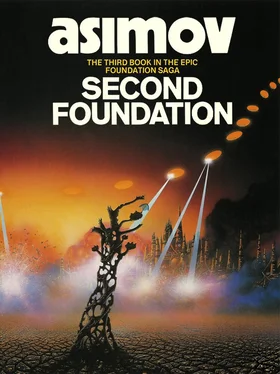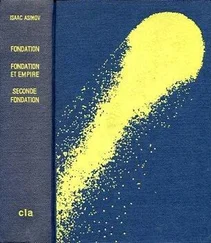Hari Seldon was the first to express what afterwards came to be accepted as truth.
“Neural microcurrents,” he once said, “carry within them the spark of every varying impulse and response, conscious and unconscious. The brainwaves recorded on neatly squared paper in trembling peaks and troughs are the mirrors of the combined thought-pulses of billions of cells. Theoretically, analysis should reveal the thoughts and emotions of the subject, to the last and least. Differences should be detected that are due not only to gross physical defects, inherited or acquired, but also to shifting states of emotion, to advancing education and experience, even to something as subtle as a change in the subject’s philosophy of life.”
But even Seldon could approach no further than speculation.
And now for fifty years, the men of the First Foundation had been tearing at that incredibly vast and complicated storehouse of new knowledge. The approach, naturally, was made through new techniques—as, for example, the use of electrodes at skull sutures by a newly developed means which enabled contact to be made directly with the gray cells, without even the necessity of shaving a patch of skull. And then there was a recording device which automatically recorded the brainwave data as an overall total, and as separate functions of six independent variables.
What was most significant, perhaps, was the growing respect in which encephalography and the encephalographer were held. Kleise, the greatest of them, sat at scientific conventions on an equal basis with the physicist. Dr. Darell, though no longer active in the science, was known for his brilliant advances in encephalographic analysis almost as much as for the fact that he was the son of Bayta Darell, the great heroine of the past generation.
And so now, Dr. Darell sat in his own chair, with the delicate touch of the feathery electrodes scarcely hinting at pressure upon his skull, while the vacuum-incased needles wavered to and fro. His back was to the recorder—otherwise, as was well known, the sight of the moving curves induced an unconscious effort to control them, with noticeable results—but he knew that the central dial was expressing the strongly rhythmic and little-varying Sigma curve, which was to be expected of his own powerful and disciplined mind. It would be strengthened and purified in the subsidiary dial dealing with the Cerebellar wave. There would be the sharp, near-discontinuous leaps from the frontal lobe, and the subdued shakiness from the subsurface regions with their narrow range of frequencies—
He knew his own brainwave pattern much as an artist might be perfectly aware of the color of his eyes.
Pelleas Anthor made no comment when Darell rose from the reclining chair. The young man abstracted the seven recordings, glanced at them with the quick, all-embracing eyes of one who knows exactly what tiny facet of near-nothingness is being looked for.
“If you don’t mind, Dr. Semic.”
Semic’s age-yellowed face was serious. Electroencephalography was a science of his old age of which he knew little; an upstart that he faintly resented. He knew that he was old and that his wave-pattern would show it. The wrinkles on his face showed it, the stoop in his walk, the shaking of his hand—but they spoke only of his body. The brainwave patterns might show that his mind was old, too. An embarrassing and unwarranted invasion of a man’s last protecting stronghold, his own mind.
The electrodes were adjusted. The process did not hurt, of course, from beginning to end. There was just that tiny tingle, far below the threshold of sensation.
And then came Turbor, who sat quietly and unemotionally through the fifteen-minute process, and Munn, who jerked at the first touch of the electrodes and then spent the session rolling his eyes as though he wished he could turn them backwards and watch through a hole in his occiput.
“And now—” said Darell, when all was done.
“And now,” said Anthor, apologetically, “there is one more person in the house.”
Darell, frowning, said: “My daughter?”
“Yes. I suggested that she stay home tonight, if you’ll remember.”
“For encephalographical analysis? What in the Galaxy for?”
“I cannot proceed without it.”
Darell shrugged and climbed the stairs. Arcadia, amply warned, had the sound-receiver off when he entered; then followed him down with mild obedience. It was the first time in her life—except for the taking of her basic mind pattern as an infant, for identification and registration purposes—that she found herself under the electrodes.
“May I see?” she asked, when it was over, holding out her hand.
Dr. Darell said, “You would not understand, Arcadia. Isn’t it time for you to go to bed?”
“Yes, father,” she said, demurely. “Good night, all.”
She ran up the stairs and plumped into bed with a minimum of basic preparation. With Olynthus’ sound-receiver propped beside her pillow, she felt like a character out of a book-film, and hugged every moment of it close to her chest in an ecstasy of “spystuff.”
The first words she heard were Anthor’s and they were: “The analyses, gentlemen, are all satisfactory. The child’s as well.”
Child, she thought disgustedly, and bristled at Anthor in the darkness.
Anthor had opened his briefcase now, and out of it, he took several dozen brainwave records. They were not originals. Nor had the briefcase been fitted with an ordinary lock. Had the key been held in any hand other than his own, the contents thereof would have silently and instantly oxidized to an indecipherable ash. Once removed from the briefcase, the records did so anyway after half an hour.
But during their short lifetime, Anthor spoke quickly. “I have the records here of several minor government officials, at Anacreon. This is a psychologist at Locris University; this an industrialist at Siwenna. The rest are as you see.”
They crowded closely. To all but Darell, they were so many quivers on parchment. To Darell, they shouted with a million tongues.
Anthor pointed lightly, “I call your attention, Dr. Darell, to the plateau region among the secondary Tauian waves in the frontal lobe, which is what all these records have in common. Would you use my Analytical Rule, sir, to check my statement?”
The Analytical Rule might be considered a distant relation—as a skyscraper is to a shack—of that kindergarten toy, the logarithmic Slide Rule. Darell used it with the wrist flip of long practice. He made freehand drawings of the result and, as Anthor stated, there were featureless plateaus in frontal lobe regions where strong swings should have been expected.
“How would you interpret that, Dr. Darell?” asked Anthor.
“I’m not sure. Offhand, I don’t see how it’s possible. Even in cases of amnesia, there is suppression, but not removal. Drastic brain surgery, perhaps?”
“Oh, something’s been cut out,” cried Anthor, impatiently, “yes! Not in the physical sense, however. You know, the Mule could have done just that. He could have suppressed completely all capacity for a certain emotion or attitude of mind, and leave nothing but just such a flatness. Or else—”
“Or else the Second Foundation could have done it. Is that it?” asked Turbor, with a slow smile.
There was no real need to answer that thoroughly rhetorical question.
“What made you suspicious, Mr. Anthor?” asked Munn.
“It wasn’t I. It was Dr. Kleise. He collected brainwave patterns, much as the Planetary Police do, but along different lines. He specialized in intellectuals, government officials, and business leaders. You see, it’s quite obvious that if the Second Foundation is directing the historical course of the Galaxy—of us—that they must do it subtly and in as minimal a fashion as possible. If they work through minds, as they must, it is the minds of people with influence; culturally, industrially, or politically. And with those he concerned himself.”
Читать дальше
Конец ознакомительного отрывка
Купить книгу











